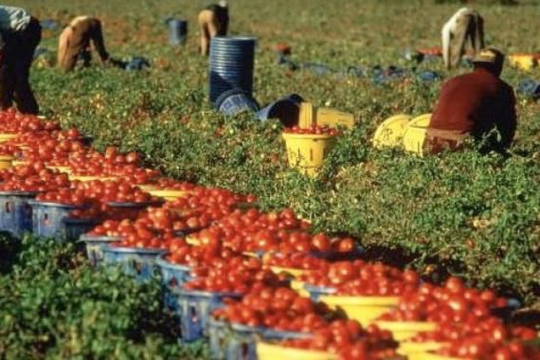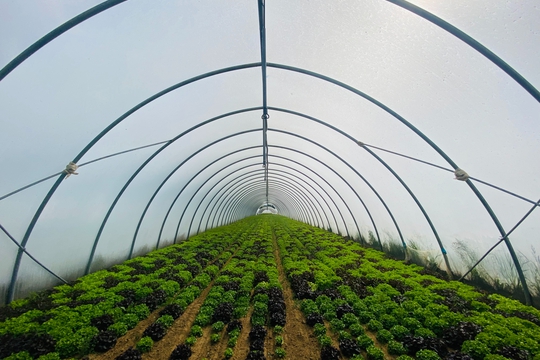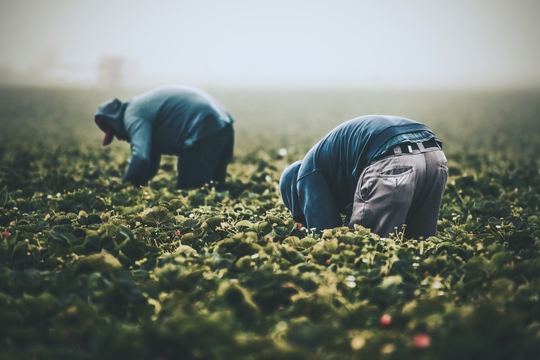Struggle of Agricultural Workers in Italy
by
Francesco Piobbichi
September 21, 2023
Featured in Seeds of Struggle: Food in a Time of Crisis (#18)
An analysis of the struggles of seasonal farm workers in Southern Italy, showing that the regulation of migrant labour is central to the control of food monopolies.

inquiry
Struggle of Agricultural Workers in Italy
by
Francesco Piobbichi
/
Sept. 21, 2023
in
Seeds of Struggle: Food in a Time of Crisis
(#18)
An analysis of the struggles of seasonal farm workers in Southern Italy, showing that the regulation of migrant labour is central to the control of food monopolies.
In the summer of 2011 around 400 agricultural workers of African origin, housed in the Masseria Boncuri in Nardò (Lecce), went on strike for almost two weeks. It was the first self-organised strike by migrant agricultural workers in Italy. The workers demanded the eradication of informal hiring practices, compliance with regional employment law and the inhousing of subcontracted workers. This struggle has activated an extensive solidarity network in this area of the economy - first locally and then nationally - which has involved trade union structures, anti-racist associations and grassroots militants. Since 2011, there have been more strikes in this area. While co-managing a migrant reception camp, Francesco Piobbichi actively participated in the struggle of seasonal workers in Nardò with the political collective Brigate della Solidarietà Attiva. Brigate della Solidarietà Attiva is a federation of organisations located throughout Italy which was established in 2009 following the L’Aquila earthquake. In the various locations they are present, they carry out grassroots self-organisation projects ranging from supporting the struggles of unemployed workers or those laid off from factories (such as Frattini and Eutelia) to welcoming Tunisians and sub-Sharian populations seeking asylum.
There are different ways to think about the theme of agricultural labour in Italy. The first is the simplest one: that is, to trust the news and the depictions presented by the media - a well-established narrative in which everything is clear, where the downfall of these workers is led by the corporals1 and the mafia who manage and control the fields. The second is to follow the symbiosis between the bordering of migrating workforces and the agricultural supply chain, to try to develop inquiries with the workers themselves and to explain things from their point of view. It’s not simply a matter of giving them a voice, more than anything it is a matter of taking on their gaze, their perspective. Imagine then that you are a labourer walking along the main street of Rosarno during the winter while it is raining. Imagine being on a beat-up bicycle and having to stop at Western Union to send a large part of your salary to Mali each month. Money that is needed to finish building a house, to send your children to school, to take care of your mother. Then get back on your bike, stop for a moment at a betting shop to try your luck and then cover a few kilometres and enter the San Ferdinando tent city. Enter a shack where other people like you live. Take off your boots, wash if there is water, cook dinner in turn, eat, exchange a few words with your companions about the damage the French are doing in Africa, go to bed and sleep if you can. Wake up in the morning and go back to work and do the same thing again until the end of the harvest. Then you leave Calabria and go to another part of Italy to pick other produce, without having a home and with the worry of having to renew your residence permit.
This is the life that tens of thousands of agricultural workers lead in Italy - between low wages, undeclared and illegal employment, a lack of services, and an entire system that tends to make their condition precarious, beginning with the residence permit. An entire system that prevents workers from having time to understand their situation, to organise and to fight. An entire system that isolates workers so that they must depend solely upon themselves. In the media reports aimed at a susceptible public, the figure of the corporal takes on the same function as the smuggler at the border – a convenient explanation that provides a moral resolution to complex phenomena. In reality, this way of addressing the question of agricultural labour misses the real crux of the matter. To understand the situation properly, we must look to the production system whose apex is the large-scale retail trade [Grande Distribuzione Organizzata]2, which is able to impose its prices on the entire supply chain. A system where the struggle for wages, direct and indirect, has been abandoned and forgotten, due for the most part, to the federated unions.
More than a decade ago I found myself organising in a reception camp for labourers in Puglia, in the Nardò area, where tomatoes and watermelons are harvested. Unlike many charitable institutions and the third sector, our collective (Brigate Solidarietà Attiva) decided to work on the principle of self-organised solidarity and social conflict. We conducted inquiries with workers, and for two seasons we collected information on wages, rights, and protections. The questions we asked concerned the relationship between border laws, the regulation of the migrant workforces and the development of the productive forces. In particular, we tried to verify concretely the possibility of intervening in this context to establish forms of direct conflict starting from the issue of salary and residence permits. We also wanted to test whether a clear example of the potential of this approach would move large trade unions to generalise the struggle throughout the supply chain involved in large-scale distribution.
During that period, the tomato crisis and the continuous reduction of day rates worked like a fuse and one morning around 800 workers in a field decided to go on strike. It was a mixed composition: Tunisians from the Arab Spring together with Sub-Saharan workers. Despite the ethnic division, they were united in their demands and blocked the harvest for a week. This strike was primarily to do with wages and the issue of residence permits but was obviously also against the corporals who extorted the workers. I realised then, not only that it was possible to develop and organise the conflict in the Italian countryside, but that it was necessary to understand the mechanism that prevented the extension and multiplication of these types of labour struggles. Thanks to the luck of finding a job that allowed me to track the moving borders of this mechanism, I then decided to investigate this more thoroughly.
It was in Lampedusa that I began to understand how this condition of invisibility of day labour could occur. It was by being in that militarised pier where the migrants landed that I came to understand that the degradation of the rights of these workers begins at the moment they set foot in Europe. An invisible barbed wire is sewn onto them and will never abandon them, making them bordered for life, wherever they go. For example, I was struck by seeing that the same riot police department that was present in the Lampedusa pier is the one that is present in front of the San Ferdinando ghetto. They are in that place as if to uphold, on a symbolic level, the state’s confinement of the mobile workforce within the logic of emergency. A labourer locked up in that space is transformed, they become “othered”, and despite having a predisposition to fight, the process of racialisation produced by citizenship laws and urban confinement weakens their resolve. According to public perceptions they are not workers but an emergency: a problem of public order. In a nutshell, the precarious condition of the immigrant labourer in Italy is a necessary condition to be able to cope with the lowering of prices imposed by the large-scale retail trade. From the end of the last century, until today, an entire system of procedures has been consolidated to control and habituate this mobile workforce to the discipline of the most extreme precariousness, both through the rhetoric of ‘public threat’ and the racialising logic of reception camps and ghettos.
In this context, the figure of the corporals is a minor problem. In the government plan against the informal recruitment agencies, one of the real players is missing, which in recent years has made enormous profits from the sweat of the labourers: the large-scale retail trade which functions as a “price maker” for the entire agricultural supply chain. An extremely fragile supply chain, supported only thanks to periodic interventions by the state, but where there is fierce competition on imposed prices which generates severe imbalances. I think the real crux is not to continue to focus on the fight against illegal hiring, which continues to skew the focus of our analysis, but to try to understand how to give workers the power to defend themselves against exploitation.
The history of the workers’ movement teaches us that when the condition of workers is so bad that one’s day to day survival becomes the priority, there is no time to organise collectively, and to demand one’s rights. It becomes even more difficult when you are a confined and invisible mobile migrant workforce. Understanding how to evade these constraints, to gain the time necessary to escape the most extreme need and to organise a fight across the entire supply chain, this is perhaps the biggest challenge we face.
-
Informal recruitment agents working on behalf of entrepreneurs who hire daily workers outside normal employment channels and without respecting the contractual minimum wage rates. ↩
-
Grande Distribuzione Organizzata is a retail system comprising a network of supermarkets and other intermediary chains. ↩
author
Francesco Piobbichi
Subscribe to Notes from Below
Subscribe now to Notes from Below, and get our print issues sent to your front door three times a year. For every subscriber, we’re also able to print a load of free copies to hand out in workplaces, neighbourhoods, prisons and picket lines. Can you subscribe now and support us in spreading Marxist ideas in the workplace?


